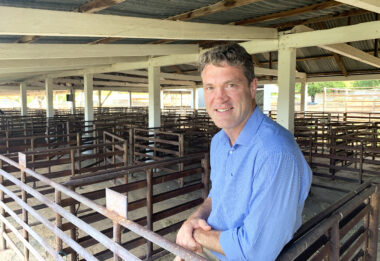La Trobe University is paving the way for Australian food security, with the establishment of a new institute that will expand cutting-edge agricultural research and innovation.
The La Trobe Institute for Sustainable Agriculture and Food (LISAF) officially launched today (23 July), to undertake research and innovation across the agri-food-health chain, aiming to enhance profitability for producers while also improving product quality and choice for consumers.
LISAF Director Professor Tony Bacic said a key component of the Institute’s “paddock to gut” research was to enhance plant functionality, enabling food and medicinal crops to be grown in innovative ways and with new properties to combat problems including climate change.
“Our new La Trobe Institute has a bold ambition to combine experts and programs in agrifood across production, business, supply chains and consumer preferences, with application of the latest technology, AI and Big Data, to create a unique one-stop shop across the span of agrifood,” Professor Bacic said.
New Federal Government grants awarded to LISAF
-
LISAF will establish a $28 million ARC Industrial Transformation Research Hub for Protected Cropping (PC Hub) with funding from the Federal Government, La Trobe and industry sponsors. The Hub is supported by a $5 million Australian Research Council grant announced in June.
Protected cropping is the production of horticultural crops sheltered by structures to provide optimum growing conditions, protecting them from pests, diseases and unfavourable climate. The protected cropping industry is the fastest-growing food-producing sector in Australia, employing 10,000 people and worth $16.6 billion annually, a figure set to rise by six per cent by the end of 2024, according to Hort Innovation Australia.
Professor Bacic said the PC Hub would transform Australia’s horticultural and medicinal agriculture industries by addressing knowledge gaps.
“The food and medicinal crops industries are worth $100 billion annually but face significant yield and quality losses pre- and post-farmgate that can be fixed through protected cropping systems of growth,” Professor Bacic said.
“Our PC Hub will work to remove climate and pest-related losses, to show Australian growers the benefits of using protected cropping.”
-
Through a National Collaborative Research Infrastructure (NCRIS) grant, La Trobe will receive $7 million over four years for the La Trobe University hub of the Australian Plant Phenomics Network (APPN).
“Our APPN node provides consultation and analysis of plants using high-resolution cameras that photograph the plants, showing growers the hydration levels and minerals needed by plants to grow to optimum size,” Professor Bacic said.
“This will reduce excess watering and fertilising of plants and make farming more efficient and cost-effective, with reduced environmental damage.
“Producers of seeds and seedlings will be able to use the analysis from our highly specialised plant-imaging technology to produce the best plants for our farmers.”
APPN CEO Richard Dickmann said he was delighted La Trobe had joined APPN’s national network of facilities.
“Learnings at La Trobe around precision fertilisation, crop management and phenotyping methodologies will readily transfer to our other APPN nodes, to help us address the need for lower input, more sustainable and more productive agriculture everywhere.”
-
Through other NCRIS grants through BioPlatforms Australia, La Trobe will also receive $7.6 million for its contribution to Plant Synthetic Biology (Synbio), Protein Atlas and the establishment of an omics imaging facility, which will identify plant features using structural and computational analysis.
Bioplatforms Australia CEO Andrew Gilbert said La Trobe’s involvement in the synthetic biology network, with deep specialisation in protected cropping, ensured a rounded national capability and would see Australia as a global leader and attractive destination for crop research and development.
“It has been a great pleasure to work with the La Trobe team for more than five years and we look forward to growing our productive partnership,” he said.
Professor Bacic said plant synthetic biology had the potential to leverage Australia’s existing and emerging strengths in industries including agriculture.
“Plant synthetic biology will accelerate the production of crops with the required traits to solve societal challenges in environmental protection, climate change, public health, agricultural productivity and resilience and environmentally sustainable manufacturing,” Professor Bacic said.
Contact details:
Elaine Cooney
E.Cooney@latrobe.edu.au
0487 448 734


